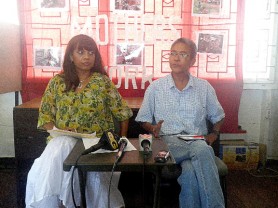Red Thread yesterday announced its partnership with a women-focused group at Cane Grove, Mahaica saying that increased community activism is one of the main steps in stemming gender-based violence in the country.

“We don’t want to see anymore deaths…,” Karen DeSouza of Red Thread said yesterday, noting that the issue of domestic violence remains a major challenge for the government and organisations which are working to counter the violence.
Red Thread and Irene Madray’s Recreational Arts and Resources Centre (IMRARC)) will collaborate on a number of projects at the community level. IMRARC was initiated some four years ago, but its work programme got off the ground in 2008.
Diane Madray, who is associated with the project, recalled that they started out working with children in an after-school setting but women started showing up. The centre’s programme eventually expanded to include counselling sessions with women and also interventions, among other things.
Madray is an overseas-based Guyanese with a background in social work and mental health and according to her, women in the Cane Grove area face real problems, which some have been brave enough to come forward and talk about while seeking help. She explained that the centre was named for her mother who is from the area.
Within the last year there were three specific cases of domestic violence which IMRARC was involved in at the community level, and Madray disclosed that they were looking at another one.
The fourth case she indirectly referred to was that of Indramattie Boladass who had died earlier this year following a heart attack, but her relatives had insisted that constant abuse led to her demise.
Karen DeSouza said the collaboration with IMRARC was important because it creates an opportunity for them to find additional ways to do something about domestic violence. She said that while the issue is gender-neutral people need to be frank about the fact women are constantly targeted and abused and are largely the victims.
DeSouza said also that deepening efforts at the community level is “one of the answers” in stemming the violence because it raises awareness among a core group of people who are close to a potential victim and or a woman who is already a victim.
Through the collaboration Red Thread and IMRARC are hoping to engage “as many people as possible that are concerned about violence,” DeSouza said, adding that the focus is on who are surviving; those who are suffering and those who are watching the violence as it continues unabated. “…This is an attempt to insert a new effort on the issue of domestic violence,” DeSouza added.
Further, DeSouza said that they are hoping to erase the notions about domestic violence being a class issue, noting that despite what some of the headlines might suggest it is not simply a poor people problem. “We have professional women who are living with it, suffering with it…”
DeSouza also spoke of the need for discussions to be ongoing about the police response, in addition to what improvements the force is making with respect to the issue. She said too that continued training is particularly important as regards the police’s approach.




